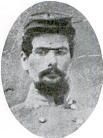Isaac Ball Feagin (1833-1900, born in Jones County, Georgia) is a merchant in Midway, Alabama, following a stint as deputy sheriff of the county (Barbour). He is of the Baptist faith.
Today the Midway Guards of the Fifteenth Alabama infantry – which Feagin helped organize at the beginning of the war and was elected its first lieutenant – is mustered into service at Fort Mitchell, Alabama. Lieutenant Feagin becomes captain of Company B, and the regiment is immediately sent to Virginia and attached to Gen. Stonewall Jackson’s corps.
Fighting in the battles of Second Manassas, Chantilly and Sharpsburg in 1862, Feagin afterwards is commissioned lieutenant colonel. He also marries Sallie Hall while on furlough in December, 1862.
Feagin, however, does experience setbacks during the war:
At the battle of Sharpsburg, Captain Feagin was wounded by the bursting of a shell, having three ribs fractured, the wound necessitating his absence from the succeeding battles of Shepardstown and Fredericksburg. He rejoined his regiment in January, 1863, and commanded it at the battle of Suffolk, May 3, 1863, and in the campaign of Pennsylvania. At the battle of Gettysburg, July 3, 1863, he was severely wounded, losing his right leg and being captured. He was confined in a Federal prison for eleven months before his exchange, and was then invalided home on leave of absence.
Colonel Feagin was of a genial, cheerful disposition, approachable at all times by any man in his regiment, calm and cool in the face of danger, never allowing himself to be carried away by excitement. An apt illustration of this characteristic was shown at the battle of Sharpsburg. The Fifteenth Alabama had been hotly engaged, being a portion of the thin line on the left with which Gen. “Stonewall” Jackson was checking the terrific onslaughts of Hooker’s, Sumner’s and Franklin’s grand army corps of the Federal army. Their ammunition being exhausted, they were relieved by a portion of Gen. D. H. Hill’s command, but had barely retired to the ordnance wagons when a portion of Hill’s men gave way temporarily before the enemy. Seeing this, General Hill ordered what was left of the Fifteenth to fill the breach. Captain Feagin explained that their cartridges were exhausted and refused to order his men to charge with bayonets, whereupon General Hill placed him under arrest and preferred the charge of disobedience of orders against him. He was tried by court-martial, but the court not only discharged him, but complimented him for his coolness and discretion.
Surviving the war, Feagin returns to Alabama and again enters public service, first in Barbour County and then in Bullock County, serving as sheriff and probate judge.
Source: “Alabama Pioneers: Feagin, Isaac Ball” (link)



